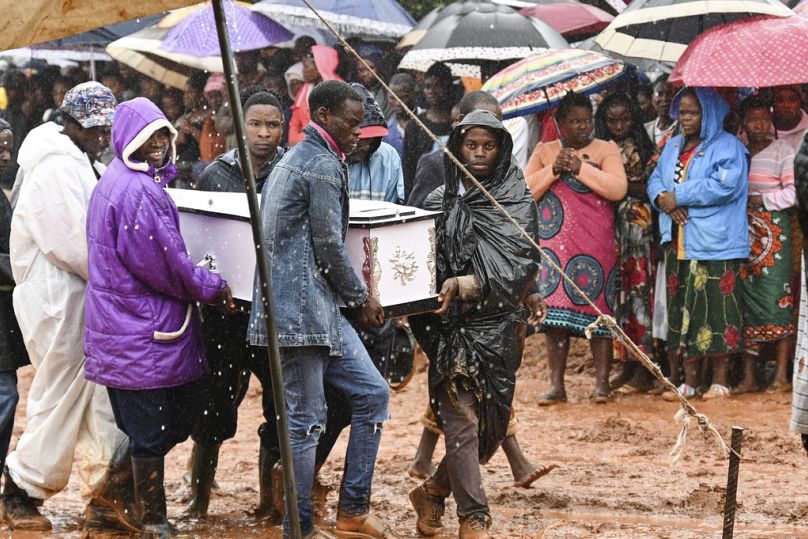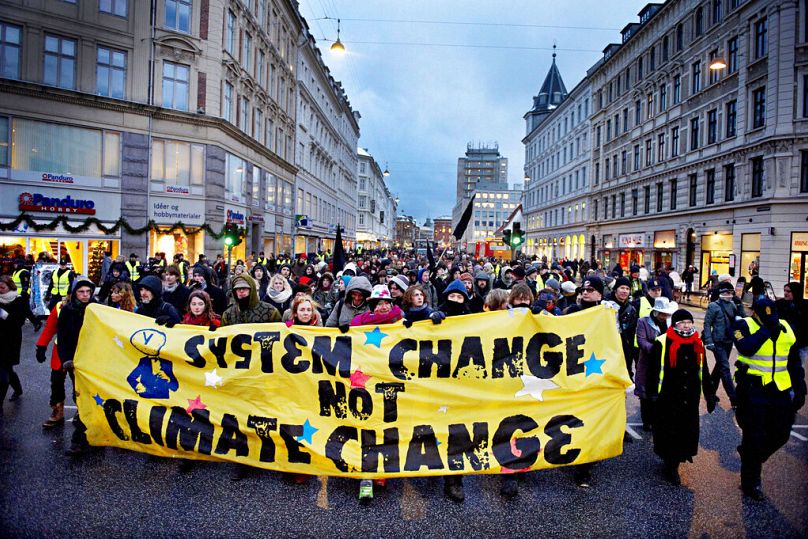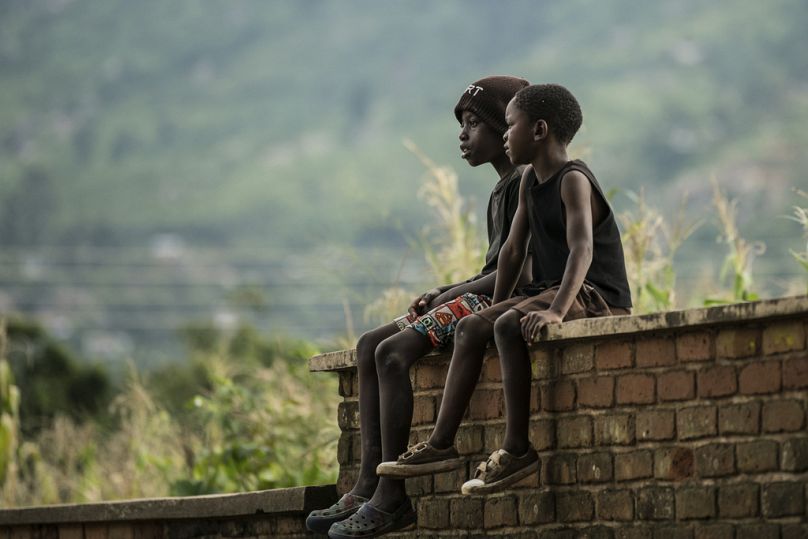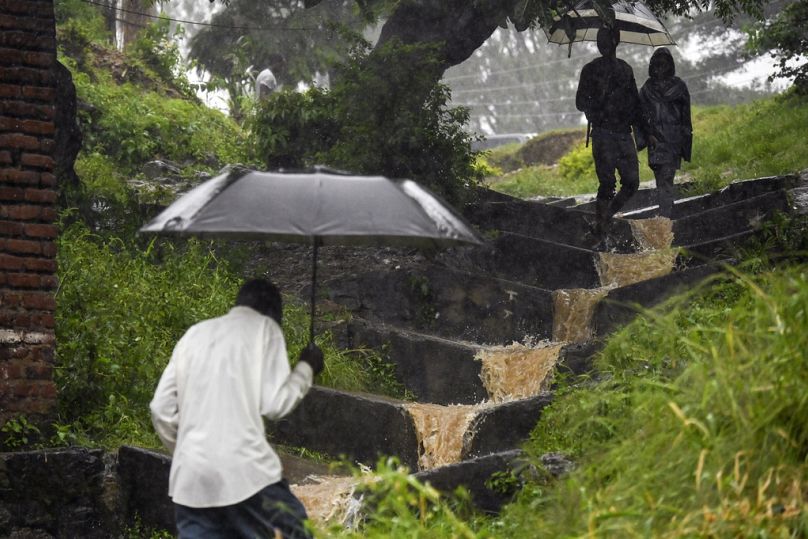If rich countries do not drastically improve their record on climate finance commitments, communities in Malawi and elsewhere will continue to pay the price, Twapashagha Twea writes.
Malawi is no stranger to climate shocks, with four major cyclones hitting the country in only the last five years.
 ADVERTISEMENT
ADVERTISEMENT
 ADVERTISEMENT
ADVERTISEMENT
Droughts and floods are also increasing in frequency and severity, with serious consequences for the population that largely depends on agriculture. It’s a similar story around the world, with floods, storms and wildfires seemingly never out of the headlines.
Meanwhile, conversations about how much climate finance should be paid to developing countries, and who specifically should pay it, rumble on.
When negotiations are in the spotlight, as they will be later this year at COP28, it’s easy to lose track of the impact that chronic underfunding is having in countries that are not only among the least prepared for climate-related disasters, but also are the least responsible for the crisis.
Cyclone Freddy: The case for adaptation
In March of this year, Cyclone Freddy brought six months’ worth of rainfall to Malawi in just six days, resulting in devastating floods and mudslides.
Over 1,000 people were reported dead or missing, with a further 500,000 displaced. Close to 205,000 hectares of farmland were destroyed, along with homes, schools, markets and hospitals.
What made Freddy particularly devastating was the fact that the country is yet to address the damages caused by two previous cyclones: Ana in February 2022, and Gombe the following month.
Plus, let’s not forget the impact that Cyclone Idai had on Malawi — along with Zimbabwe and Mozambique — in 2019.
Inadequate investment for preparedness and risk reduction, as well as shortfalls in recovery actions, have resulted in an increase in loss and damage after each disaster.
Substantial support from the international community is urgently needed if the impact is to be minimised when the next extreme weather event inevitably occurs.
Simply put, the example of Malawi makes the case for properly-funded climate adaptation initiatives all too clear.
Prioritise adaptation for a more resilient future
At COP26 in 2021, the Glasgow Climate Pact called on developed countries to at least double their adaptation finance provision from 2019 levels by 2025.
While adaptation finance had been increasing even before the agreement was made, the data suggests that the target of $40 billion (€37.2bn) per year is highly unlikely to be met.
Some countries are meeting their "fair share" of the goal — based on the sizes of their economies and populations, as well as their track record on carbon emissions — yet others are way off the pace.
At the time of signing the pact, Australia, Canada, Spain, the UK and the US were all contributing less than two-thirds of what they should.
If the adaptation finance target is indeed missed, it will be all too familiar a story. At COP15 in 2009, the same countries agreed collectively to be paying at least $100bn (€93bn) in climate finance each year by 2020.
Despite re-confirming the arrangement in 2015, and again in 2018, the target has been missed year after year. While it may finally be reached in 2023, that’s three years late.
Climate finance as a whole remains woefully underfunded
The situation would look even worse had eight countries not provided more — and in some cases, substantially more — than their fair share. Meanwhile many of the world’s largest economies are among the worst performers.
The US, for example, should have contributed $43.5bn (€40.5bn) in 2021, but only provided $9.27bn (€8.6bn) — barely a fifth of its fair share.
Once you factor in the other fourteen countries coming up short, some of which owe billions more than they currently contribute, it paints a grim picture.
“In 2021, Malawi received only $130 million (€120.8m) in climate finance, of which $87m (€80.8m) was for adaptation — certainly not enough to meet the needs,” says Tony Kamninga, a climate finance data expert for ODI, and a Malawian.
As he pointed out, "Despite being responsible for less than 0.5% of global carbon emissions, Malawi is paying a heavy price for the failure of developed countries to mitigate the climate crisis."
Restoring trust is vital
Another consequence of chronic underfunding is the fuelling of political tensions that undermine trust in international cooperation efforts.
It does the COP process no favours to see the same group of wealthy nations consistently failing to honour the commitments that they themselves made – especially as they are most responsible for the climate crisis in which Malawi, and similarly climate-vulnerable countries, find themselves.
Issues of transparency and accountability must be addressed, and new and additional finance confirmed to avoid double-counting and the inflation of reported numbers.
Better data, combined with more consistent mechanisms for pledging and reporting, will help to bolster faith in the process.
Furthermore, countries whose commitments are heavily skewed towards the provision of loans rather than grants must change course, and prevent an additional (and wholly unacceptable) debt burden from falling on developing countries.
Time to unlock the power of adaptation
In our work with the Zurich Flood Resilience Alliance in Malawi, we’ve seen how timely adaptation measures such as early warning systems and natural resource management can significantly reduce the impact on communities at risk of floods and other weather-related hazards.
However, as long as the current huge shortfall in adaptation finance persists, many communities around the world will remain exposed.
Both the quantity and quality of climate finance must be improved to help vulnerable nations and communities adapt to the climate emergency before it’s too late.
Twapashagha Twea is a Policy and Advocacy Manager for Concern Worldwide, based in Malawi.
At Euronews, we believe all views matter. Contact us at view@euronews.com to send pitches or submissions and be part of the conversation.














